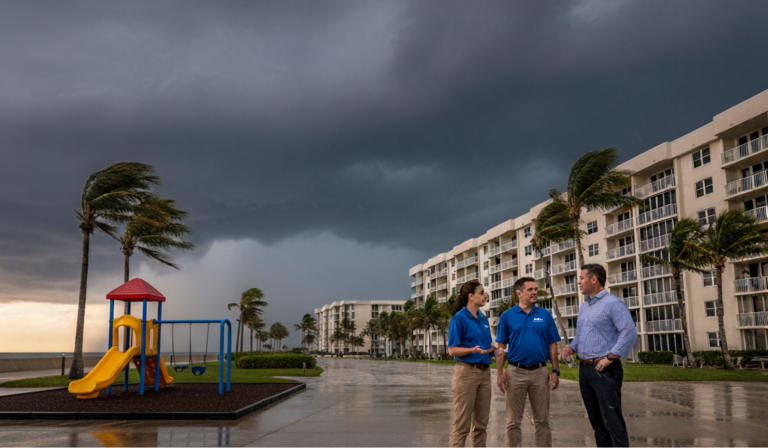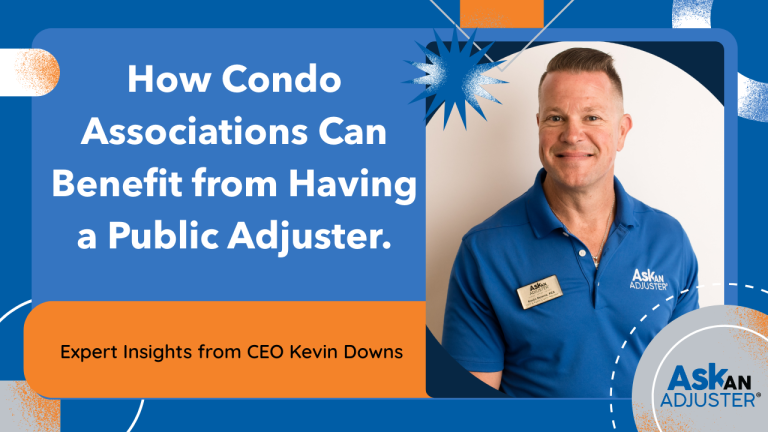Interview with Kevin Downs, CEO of Ask An Adjuster
When hurricanes, plumbing failures, or other unexpected disasters strike, condo associations often face one of the biggest financial challenges they’ll ever encounter — dealing with insurance claims. According to Kevin Downs, CEO of Ask An Adjuster, “Handling your claim on your own as an association would be like going to court without your own attorney. It would not be wise at all.”
In this interview, Kevin breaks down the most common mistakes he sees associations make, and how having a public adjuster on your side can save millions — and prevent unnecessary special assessments.
1. Why Every Condo Association Needs an Annual Policy Review
“Condo associations spend a lot of money on insurance,” Kevin explains. “Most only find out what’s in the policy when they go to use it. Many times, coverages are missing, there are huge deductibles, or gaps that don’t benefit them.”
That’s why Ask An Adjuster offers free annual policy reviews for associations. “It just makes so much sense for condo associations to have their own public adjuster reviewing their insurance each year,” Kevin adds. “That way, they know exactly what’s in their policy before a claim ever happens.”
2. Common Policy Gaps That Leave Associations Exposed
Even associations that think they’re fully covered often have major surprises hidden in the fine print. Kevin points to three of the biggest:
- Flood vs. All Other Perils – “Flood coverage is separate from hurricane, plumbing, or mold issues — and most associations don’t realize that until it’s too late.”
- ACV Roof Schedules – “We’re seeing new movements toward Actual Cash Value roof schedules. That means as roofs get older, the coverage pays less and less. You could be owed a full roof replacement but get almost nothing.”
- Dispute Resolution Clauses – “Many policies now include New York arbitration. It’s expensive and makes it difficult to fight for a fair settlement. Associations need to know that before a claim happens.”
He continues, “Over the last 20 years, we’ve helped recover over $2 billion — hundreds of millions of that for condo associations — saving them from unnecessary special assessments.”
3. Preparing Before Storm Season
Kevin urges associations to be proactive: “Most are thinking only hurricanes are covered. In reality, there are tons of claims for plumbing issues, AC overflows, lightning, mold — all covered benefits that many never collect because they don’t have their own adjuster.”
Having an advocate ensures associations don’t rule themselves out of coverage. “Having a public adjuster looking out for you and your policy is very important,” Kevin says.
4. The Power of a Certificate of Good Condition
“The number one reason condo associations are denied is because of preexisting conditions,” Kevin reveals.
Ask An Adjuster created the Trademarked “Certificate of Good Condition” to solve that. “We come out for free, perform an inspection, and issue a certificate showing that as of today, there are no preexisting conditions. So, when a storm hits, you can prove the damage is new and covered under your current policy.”
5. Identifying Hidden Damage
Not all damage is visible. “We just delivered $400,000 to a condo association that thought their damage was below their deductible,” Kevin shares. “They were going to patch it up and move on.”
Ask An Adjuster uses thermal imaging and moisture detection equipment to find hidden problems. “It’s not the obvious damage that hurts you — it’s the hidden damage you don’t see until it’s too late.”
6. When to Call a Public Adjuster
Kevin’s advice is simple: “Anytime you’re going to spend money on repairs, let us come out and take a look. It doesn’t mean you’re filing a claim, but at least you’ll know if the insurance should be paying for it. It can help you avoid unnecessary special assessments.”
7. How Ask An Adjuster Handles the Heavy Lifting
Once appointed, the team takes full control of the process: “We inspect, document, determine the cause of loss, prepare the scope of work and estimate, file the claim, meet the insurance adjusters, and even advance costs for experts if needed.”
8. Why You Shouldn’t Rely Solely on Your Insurance Company’s Adjuster
Kevin makes it clear: “I’ve always thought it was crazy that the person who has to pay you is also the one who tells you how much they owe you.”
Insurance company adjusters work for the carrier — not the association. “They’re called ‘independent adjusters,’ but they’re not independent,” he says. “They’re trained, paid, and directed by the insurance company.”
The only licensed advocates for an association are public adjusters and attorneys. “We make sure associations get what they’re actually owed — what they paid for.”
9. If You’re Underpaid or Denied
“It’s always free for us to come out and review a policy,” Kevin explains. “If your claim was denied, underpaid, or you haven’t filed at all, we can still help.”
He warns that many associations miss their deadlines: “Once deadlines pass, they’re 100% out of pocket. We’ve had associations call us, get a Certificate of Good Condition, and then when a new storm hits — they get paid quickly and fairly.”
10. How Fees Work — and Why It’s Risk-Free
“We’re heavily regulated by the Florida Department of Financial Services,” Kevin says. “Our compensation is contingency-based — we only get paid if we deliver a check beyond your deductible. If we don’t get anything, you don’t owe us anything. There’s zero risk.”
11. Building Long-Term Protection
Kevin emphasizes that Ask An Adjuster doesn’t just show up after a storm — they partner with associations for the long haul.
“We love partnering long-term,” he says. “Through our Certificate of Good Condition and annual policy review, we make sure our associations are always ready. That way, when something happens, they’re in a great position to get paid quickly, fairly, and avoid special assessments.”
Final Thoughts
Public adjusting isn’t just about recovering from disaster — it’s about preparing for it. As Kevin Downs sums up, “The best time to meet your public adjuster is before the storm, not after.”
Call now at (877) 275-0275 or click HERE for a complimentary 13-point Inspection, a FREE Policy review, and your Certificate of Good Condition.


